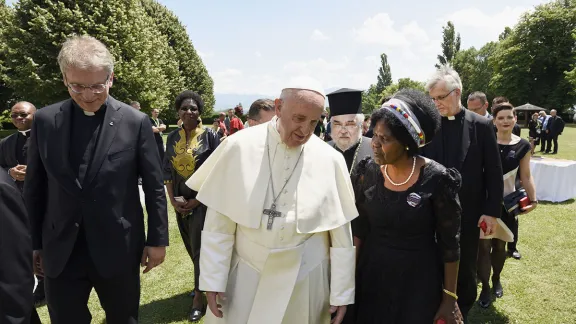
Pope Francis at the Bossey Ecumenical Institute with Rev. Dr Olav Fykse Tveit, WCC general secretary, Dr Agnes Abuom, moderator of the WCC Central Committee, Metropolitan Gennadios of Sassima, Vice-Moderator of the WCC Central Committee, and Rev. Dr Martin Junge, LWF General Secretary. Photo: Peter Williams/WCC
Reassuring commitment to unity and ecumenical relations
(LWI) “The visit of Pope Francis to Geneva is an encouragement to the ecumenical movement, on the way to the unity into which Christ calls the church,” the Lutheran World Federation (LWF) General Secretary Rev. Dr Martin Junge said.
Pope Francis came to Geneva at the invitation of the World Council of Churches, which is celebrating its 70th anniversary. “We rejoice that Pope Francis recognizes the contribution of the WCC to the ecumenical movement. His commitment to unity and ecumenical relations is reassuring,” the LWF general secretary said.
The program of the day included a prayer service in the chapel of the Ecumenical Centre, lunch and discussion at the Ecumenical Institute in Bossey and a lecture in the main hall of the Ecumenical Centre. The LWF was represented by General Secretary Junge and LWF Assistant General Secretary for Ecumenical Affairs, Rev. Dr. Kaisamari Hintikka.
A symbol of Catholic-Lutheran unity
In 2016 Pope Francis, General Secretary Junge and LWF President Bishop Dr Munib A. Younan led the Joint Catholic-Lutheran Commemoration of the Reformation in Lund and Malmö, Sweden. A common prayer in Lund Cathedral highlighted the substantial ecumenical developments between Catholics and Lutherans and the joint gifts received through dialogue. The joint commemoration also provided an opportunity for LWF World Service and Caritas Internationalis to commit to closer cooperation in humanitarian work.
The Lund Cross which was used in the Joint Commemoration is now located in the chapel of the Ecumenical Centre, where the ecumenical prayer service took place today.
“Focused on the cross of Christ, God's redeeming and reconciling power continues transforming our relationships. With God's help, we will continue walking away from conflict to turn into the gift of communion,” said General Secretary Junge.
Fifty years of ecumenical dialogue
The Lutheran-Roman Catholic dialogue has been ongoing for more than fifty years. It is will enter a new dialogue phase in 2019, focusing on church, ministry, and Eucharist. The dialogue has led to significant milestones, including the Joint Declaration on the Doctrine of Justification (JDDJ) in 1999 and the report From Conflict to Communion in 2013.


